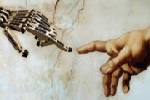Take a moment and think how you would characterise your company; as a machine, or an organism? Your answer has significant consequences.
The machine view is that your company is made up of a collection of gears, cams, cogs, levers and buttons, connected so as to achieve a coherent result. It operates in a repeatable and predictable pattern, and although the machine can become extremely complex, when operated by someone who knows what they are doing, the machine can produce the desired outputs on demand.

The operator, otherwise known as the boss, decides what the machine will produce and the hope is that they are correct in their assumptions about what the machine CAN produce, and they have the skills to drive the machine successfully. The individual cogs don’t have any say in the machines’ purpose, or indeed any ability to be anything other than a cog whose duty it is to turn on demand.
The organism view is that your company is made up of people who are the cells that make up the greater organism. They have far more autonomy than a cog in the machine in terms of how they fulfil their purpose within the organism for the greater purpose of the whole organism. They also have far more variability, and so do not have the predictability that you would expect from a cog in a machine. Groups of cells specialise and, if left to their own devices, evolve over time to deal with challenges in much the same way as your feet will develop tough skin from walking barefoot.
Which metaphor makes more sense to you in terms of how your company actually is, and how you would like it to be?
If you are the boss, do you see yourself as outside the machine, and your job is to drive and control it? Or do you see yourself as part of the organism, and your role as one of the specialist cells in the organism, is to provide purpose and direction?
And what if things go wrong? If your company needs ‘fixing’, do you need help from someone with the skills of a doctor/vet/biologist, or a mechanic/engineer?
So much of our training in management with models and organisational theory which are reinforced by the consultancy on offer for process consulting in all its different guises, steers us into thinking of the organisation as a machine. There is an underlying, and seductive message that we are, or can be, in control.
However, what if the formal and official story of your organisation is that of the machine, and you operate as though it is, whereas in reality, it mostly resembles a living organism? What then?

About the author:
Paul Matthews is the founder of People Alchemy and expert in workplace learning, especially informal learning, as well as management development and employee performance improvement. He is the author of “Informal Learning at Work: How to Boost Performance in Tough Times” and “Capability at Work: How to Solve the Performance Puzzle”. For further information please visit www.peoplealchemy.co.uk
Latest blog posts
- Is There a Santa Clause?
06 / 12 / 2023
- Lend Us a Hand!
22 / 11 / 2023
- What Happens When There is a Clash in Protected Characteristics?
17 / 10 / 2023
- Encouraging a Healthy Workforce 2
21 / 09 / 2023
- Encouraging a Healthy Workforce
23 / 08 / 2023
- What a Disaster - (But We Have a Cunning Plan!)
20 / 07 / 2023
- It’s Time We Stiffened the Sinews
14 / 06 / 2023
- Why Is It So Important to Develop Emotional Resilience?
16 / 05 / 2023
- When is a discretionary bonus not discretionary?
20 / 04 / 2023
- Recovering Training Costs 15 / 03 / 2023
